Disciple: Funding Mission
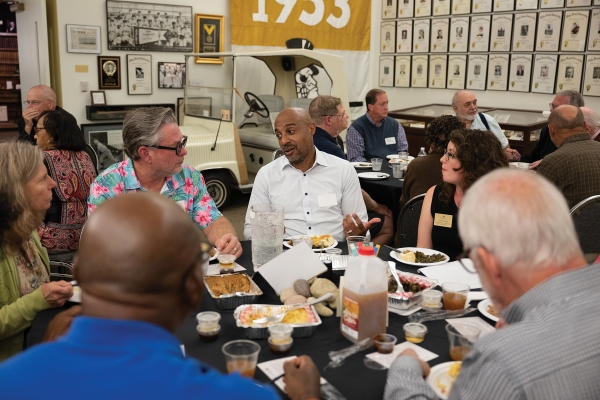
Whether for a new outreach ministry, clergy salary support, global missions, physical plant needs, seminary tuition or theological education for lay people, the Diocese of North Carolina has an extensive grants program to provide support to churches, ministries and individuals. During the 2022 calendar year, the Diocese distributed more than $1.2 million as part of its ongoing grants program, plus an additional $333,000 in adaptation and innovation grants during 2021 and 2022 as part of its response to the COVID-19 pandemic. Across the following pages, we’ve highlighted some of the ways this financial support contributes to mission and ministry across the Diocese and around the world.
[Pictured: On October 13, 2022, community members gathered as part of the Wake Forest Community Table to discuss the root causes of food insecurity in the community. Photo by Joy Shillingsburg]
MISSION ENDOWMENT GRANTS
Established in 2015, the Mission Endowment Grant is a permanent endowment created for the specific purpose of supporting the goal of establishing “the Episcopal presence of Christ in communities in ways that bring the community to see Christ’s presence among them.” While grant projects must relate to missionary initiatives located within the 38 counties of the Diocese, the initiatives themselves do not have to be associated with a diocesan congregation or ministry. Only one participating member of the proposed project team is required to be associated with a diocesan entity; the rest of the team can build out from there. This opens the door to greater eligibility, including strategic partnerships between diocesan churches and ministries and outside organizations, including interfaith and secular entities; companion relationships; and partnership ministries involving congregations, ministries and organizations of the Diocese.
One and two-year grants are available; five grants ranging from $5,000 to $25,000 are awarded each year. Applications are due annually on May 1, a change from the previous semiannual deadlines. Contact the Rev. Amanda Stephenson, temporary Mission Endowment Grant chair, with questions. The Rev. Robert Black will return as chair on July 24.
FROM CHURCH MINISTRY TO 501(c)3
During the spring 2021 Mission Endowment Grant cycle, the Wake Forest Community Table received a two-year, $18,000 grant to transition from a ministry of the church to an independent 501(c)3 nonprofit. The grant allowed the church to hire Joy Shillingsburg as the organization’s part-time executive director. During the past two years, she assembled a board of directors and a volunteer advisory team. Together they drafted bylaws, secured ongoing funding and increased the ministry’s visibility in the community as an emerging nonprofit. In October 2022, the Wake Forest Community Table completed all of the requirements to become an independent 501(c)3 and in November held its first official board meeting.
Of course, the ultimate goal of achieving independent nonprofit status isn’t filing a deluge of paperwork. The mission of Wake Forest Community Table “is to connect members of [the] community to the essential resources of food and personal care items and to each other through community gatherings. Gathering diverse members of [the] community for food, connection and education, [the organization] seeks to transform the systems that necessitate the services [it] provides.” In 2022, Wake Forest Community Table served 7,421 meals, including thousands of pounds of fresh produce from two community gardens, at two locations in Wake Forest, and it hosted four community gatherings that brought together between 60 and 80 diverse community members to learn history, share stories and think about the systems that cause the need in the community.
The ministry has also increased St. John’s presence in the Wake Forest community. According to Shillingsburg, newcomers to the church have repeatedly cited the church’s community outreach as their reason for visiting or joining. Members of the congregation serve meals, bake desserts, deliver produce, pray for their neighbors and attend community gatherings. “Wake Forest Community Table has reframed and is a living model to our congregation of outreach that is relational rather than transactional,” Shillingsburg said.
“It is more than a meal program; it has built relationships between diverse members of our community and encouraged both food secure and insecure community members to join together in understanding the cause of inequity in our community and country and to advocate in small and large ways to build beloved community.”
ENDING HOMELESSNESS IN ANSON COUNTY
In March 2017, a group of concerned citizens, including Chipper Long of Calvary, Wadesboro, and All Souls’, Ansonville, began meeting to discuss the issue of homelessness in Anson County. With the assistance of a $25,000 Mission Endowment Grant, the group founded Anson County Homes of Hope and within a year had incorporated, received recognition from the IRS as a 501(c)3, assembled an active and diverse board of directors, and began looking at properties to acquire and convert for affordable, transitional and emergency housing. The first resident moved in on November 1, 2019.
Since then, Anson County Homes of Hope has received additional grants, most recently during the fall 2020 cycle when the organization received the funding to renovate half of a duplex for a bridge housing program. Throughout the time period it relied on funding from the Diocese to incubate the fledgling mission, Anson County Homes of Hope’s board of directors and Long, who now serves as executive director, have been taking steps to qualify for government funding and building relationships with other funders to ensure the long-term financial stability of the organization.
PARISH GRANTS FOR NEW PROGRAMS
Administered by the chartered committee on grants, the parish grants program provides seed grants of up to $3,000 for congregational outreach programs. Due to the effects of the COVID-19 pandemic, during the last several years, applications have been down, and the committee has awarded only five grants, two of which we profile below.
The grant uses the Common Application, and applications are accepted on a rolling basis. Contact Emerson Bell, chair of the chartered committee on grants, with questions.
CREATIVELY CONNECTING COMMUNITY WITH GOD
 In August 2022, St. Martin’s, Charlotte, received a $3,000 parish grant to fund its project, “Creatively Connecting Community and God,” part of the church’s focus on culture and building relationships with Charlotte’s artistic community (“Culture Shift,” Summer 2022 Disciple).
In August 2022, St. Martin’s, Charlotte, received a $3,000 parish grant to fund its project, “Creatively Connecting Community and God,” part of the church’s focus on culture and building relationships with Charlotte’s artistic community (“Culture Shift,” Summer 2022 Disciple).
“Everyone is creative,” Lillian Richards, St. Martin’s director of creative engagement, said. “Creativity is about being open, collaborative and trying new things. It does not mean having a pretty, finished product or even ‘being artistic.’ Creativity is about the process and experience. The Holy Spirit is very much present in the creativity movement at St. Martin’s and in our intentionality to expand this to even greater engagement of the congregation and the community.”
The parish grant has funded several offerings since August, including opportunities to create meditative prayer art, which, in turn, led to the creation of a guild that gifts pieces of this art to people who are baptized or confirmed.
[Pictured: An example of Kintsugi from a workshop hosted by St. Martin’s, Charlotte. Photo by Lillian Richards]
Other offerings have nurtured ties with the artist community with which the church seeks to deepen its collaboration. Local artist Eva Crawford recently led a Kintsugi workshop at the church. Kintsugi is the Japanese art of repairing broken pottery with lacquer dusted with gold, silver or platinum, so the break becomes part of the art instead of something to be hidden, an apt metaphor for divine forgiveness.
The grant also will allow the church to expand on its annual outdoor Stations of the Cross art installation, which began as a project of the youth group in 2017 and grew to include anyone in the parish who wanted to create a representation of one of the stations. The program expanded further in 2021, when the Be-With Art Partnership was established. The partnership invites local artists to apply to depict one of the 14 stations, chosen by the church. This year, the winning artist’s stipend will be funded by the parish grant.
While cultivating collaborations with professional artists, the church includes everyone in creative pursuits. Drawings created by children in the Catechesis of the Good Shepard program, as well as photographs of the sanctuary’s stained glass windows, form the cover of each Sunday’s bulletin, and the church is currently planning an arts-based Vacation Bible School for the summer.
CREATIVE BELONGING
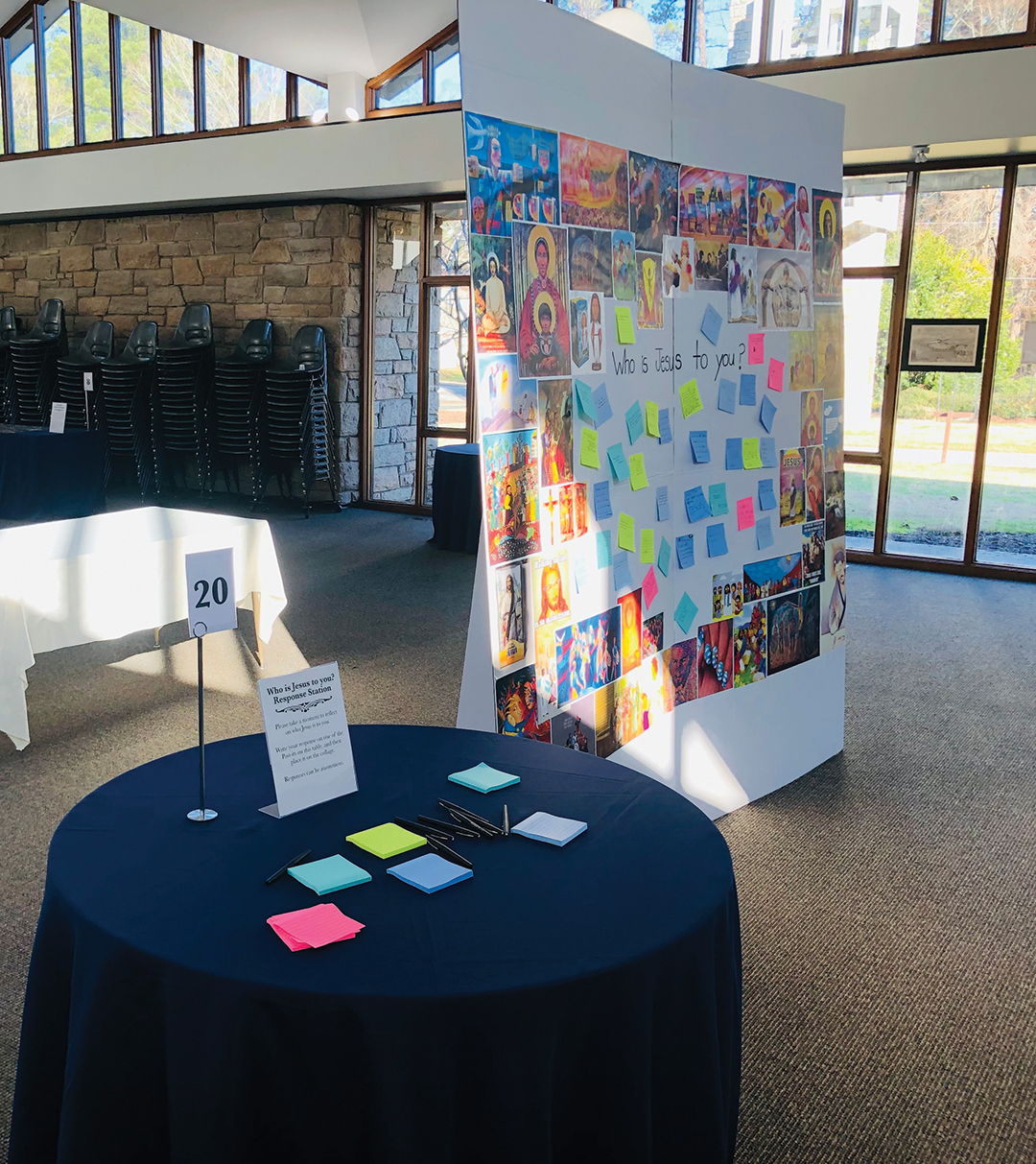 In October 2019, St. Stephen’s, Durham, received a $3,000 parish grant to fund “Creative Belonging,” a project that aims to build and sustain community across lines of difference, especially race. Through a series of interactive experiences that blend together theology and arts—what project leader Jeremy Godwin, St. Stephen’s director of formation, calls a “theo-aesthetic” approach—parishioners learn through shared experiences, solo reflection and group conversations.
In October 2019, St. Stephen’s, Durham, received a $3,000 parish grant to fund “Creative Belonging,” a project that aims to build and sustain community across lines of difference, especially race. Through a series of interactive experiences that blend together theology and arts—what project leader Jeremy Godwin, St. Stephen’s director of formation, calls a “theo-aesthetic” approach—parishioners learn through shared experiences, solo reflection and group conversations.
Before the pandemic put a temporary halt to plans, the congregation experienced an exhibit entitled “Christ | Culture | Community” in January 2020. The parish hall became a multimedia museum displaying images of Christ from the Colonial era to the present day, ending with an interactive opportunity for reflection on who Jesus is to each individual.
Then they each had time to ponder the experience.
[Pictured: The interactive processing activity at the end of the “Christ | Culture | Community” installation at St. Stephen’s, Durham. Photo by Jeremy Godwin]
A few weeks later, participants reconvened for a response session, during which they talked about the effect of race and racism on how they understand who Jesus is and what that means for Christians and the Church. The pause between experience and reflection is deliberate. Godwin, whose dissertation action research project formed the basis for Creative Belonging, designed the approach that way.
“The experience is a shared one, but there’s no pressure to respond in that moment,” he explained. “Time is provided to think and reflect before coming together to discuss. Overall, that approach really seemed to resonate.”
Godwin will design future offerings with insights from the first response session in mind.
“That’s the whole idea of Creative Belonging, really. It’s not a pre-planned curriculum. It’s meant to be tied to the specific needs and concerns of the folks participating.”
CONTINUING THEOLOGICAL EDUCATION GRANTS
Administered by the chartered committee on grants, the Continuing Theological Education (CTE) grants program provides grants of up to $1,000 to help clergy and lay people participate in theological education programs. As the following examples illustrate, the grants cover a wide variety of programs.
Applications are accepted on a rolling basis. Contact Emerson Bell, chair of the chartered committee on grants, with questions.
EQUIPPED TO LEAD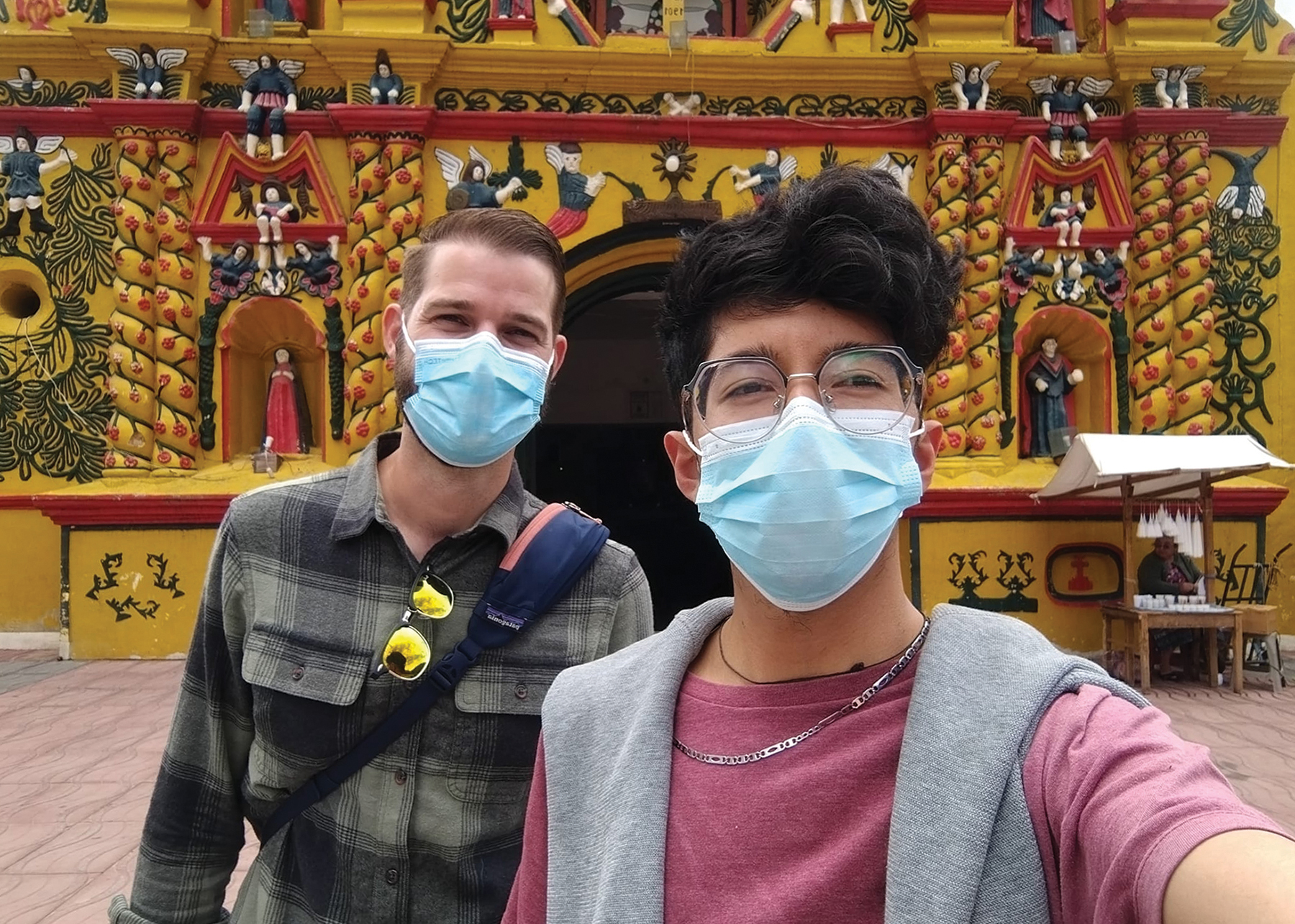 When the Rev. Philip Zoutendam began serving as a supply priest in a Spanish-speaking congregation in 2021, he could lead the service out of the Book of Common Prayer and deliver a sermon in reasonably good Spanish, but he did not feel fluent enough truly to pastor the congregation. In order to bolster his skills, Zoutendam applied for and received a Continuing Theological Education grant that helped fund a Spanish immersion trip to Guatamala, where he studied at a language school in Quetzaltenango. After five hours per day of one-on-one instruction, homework, and activities like cooking classes and excursions, he had greatly increased his competency and proficiency.
When the Rev. Philip Zoutendam began serving as a supply priest in a Spanish-speaking congregation in 2021, he could lead the service out of the Book of Common Prayer and deliver a sermon in reasonably good Spanish, but he did not feel fluent enough truly to pastor the congregation. In order to bolster his skills, Zoutendam applied for and received a Continuing Theological Education grant that helped fund a Spanish immersion trip to Guatamala, where he studied at a language school in Quetzaltenango. After five hours per day of one-on-one instruction, homework, and activities like cooking classes and excursions, he had greatly increased his competency and proficiency.
[Pictured: The Rev. Philip Zoutendam and a classmate during a trip to La Iglesia de San Andres de Xecul in Quetzaltenango, Guatemala, where he took a Spanish immersion course. Photo courtesy of Zoutendam]
“I hope to be able to serve Spanish-speaking or bilingual parishes both now and in the future,” Zoutendam explained. “My program in Guatemala helped me to take some concrete steps toward that goal.”
THINKING GLOBALLY
The Rev. Mawethu Ncaca, a curate in the Reimagining Curacies program, had several goals going into last year’s diocesan pilgrimage to Botswana: comparing and contrasting seminary education in Botswana with others he had experienced and learning how seminarians and new priests are integrated into their parishes; understanding how the companion diocese relationship with the Diocese of Botswana is maintained and coordinated; and participating in the 50th anniversary celebration for the Diocese of Botswana. With the help of a Continuing Theological Education grant, he achieved his goals.
“During my time in Botswana, I met a young seminary student at St. Augustine Theological Seminary,” Ncaca said. “It was encouraging to see his passion and love for university ministry, for working with university students, and his willingness to start something new. But as we discussed strategies to reach out to students, it dawned on me and him both that seminary sometimes does not prepare its students for practical ministries outside of parish ministry. He lamented the lack of contemporary theological and pastoral resources, whether books or human resources, like mentors, for new ministries outside parish ministry. This experience continues to shed light on the relevance of seminaries and their relationship in adequately equipping ministers for the world. It raises the question: How does the formation of priests in seminary impact our world and is the curriculum relevant?”
This and his other experiences in Botswana will serve Ncaca in his role as the diocesan global mission advocate, a new position. He has already begun sharing what he learned in Botswana through podcast appearances and a panel discussion, “South Africa: Apartheid, Here and There, Apartheid, Now and Then” with fellow pilgrim Joy Shillingsburg and the Rev. Xolani Dlwathi, a priest from South Africa, hosted by St. John’s, Wake Forest, in February.
DISCERNING A CALL
“Either directly or indirectly, these grants have empowered me to realize the dream of pursuing ordained priesthood in our branch of the Jesus Movement.”
That is Chipper Long’s summation of his experience with the diocesan grants program. In addition to the grants he has helped Anson County Homes of Hope receive, Long also received a Continuing Theological Education Grant in 2022. After discerning that he might feel a call to the priesthood, Long decided to earn a Master of Divinity to further his discernment process. Remaining financial aid balances from his Master of Pastoral Studies degree posed a financial hurdle, but the CTE grant allowed Long to focus on his studies. He is dual-enrolled at Bexley-Seabury Seminary and Chicago Theological Seminary, where he is pursuing a Master of Sacred Theology with an emphasis in LGBTQI+ Studies. He hopes to be ordained in 2024 and plans to serve bivocationally by continuing his employment as the executive director of Anson County Homes of Hope.
“I guess you can say that I am the poster child or leading example of what and how the Diocese invests resources to positively impact personal lives, the church and our communities in the Diocese.”
GLOBAL MISSION GRANTS
The global mission grants program funds requests centered around international mission relationships originating from within the Diocese of North Carolina, from a global entity with an established relationship within the Diocese or from North Carolina congregations seeking global partnerships. Priority is given to proposals that address specific community needs as defined by a global partner, empower the community being served and are sustainable. The companion diocese subcommittees for Botswana and Costa Rica also award grants for work specific to those dioceses.
Grants are awarded in amounts ranging from $1,000 to $5,000. Applications are due semiannually on April 1 and October 1, although exceptions are made for proposals related to emergencies, such as natural disasters or public health crises, identified by a global partner. Contact the Rev. Rebecca Yarbrough or Dora Mbuwayesango, chartered committee on global mission co-chairs; the Rev. Matt Addington, Costa Rica global mission subcommittee chair; or the Rev. Miriam Saxon, Botswana global mission subcommittee chair, with questions.
TOMATOES AND MOTORCYCLES IN KENYA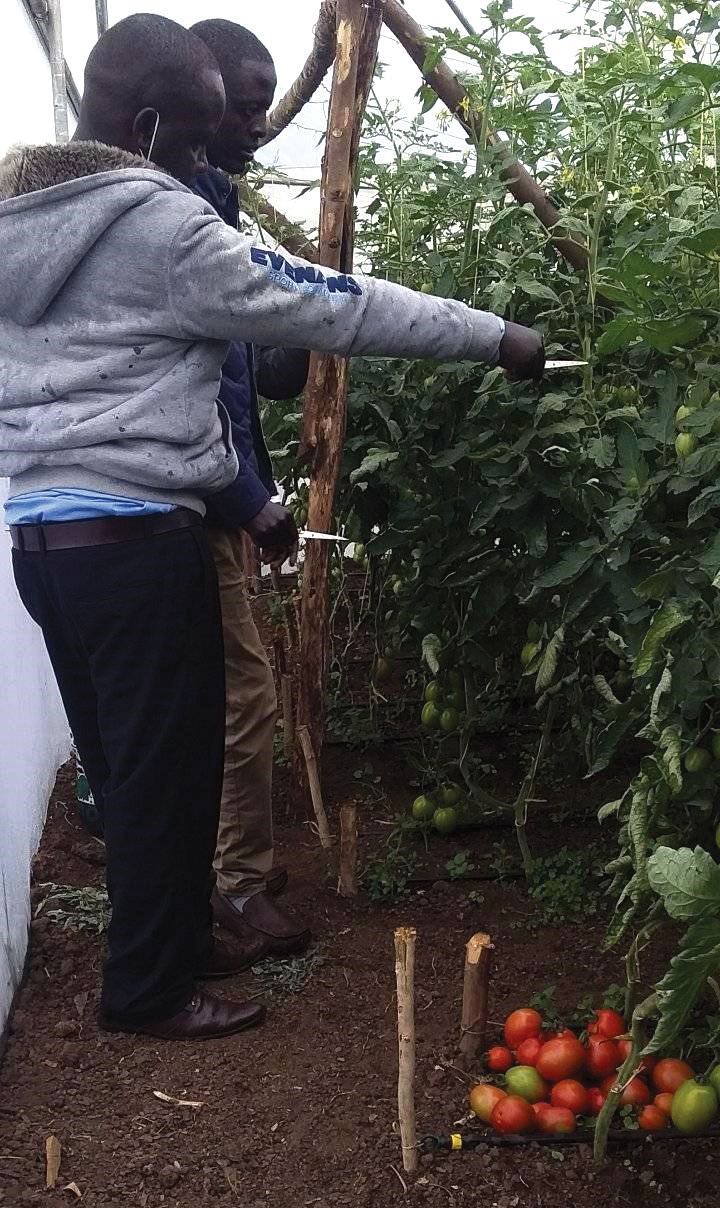
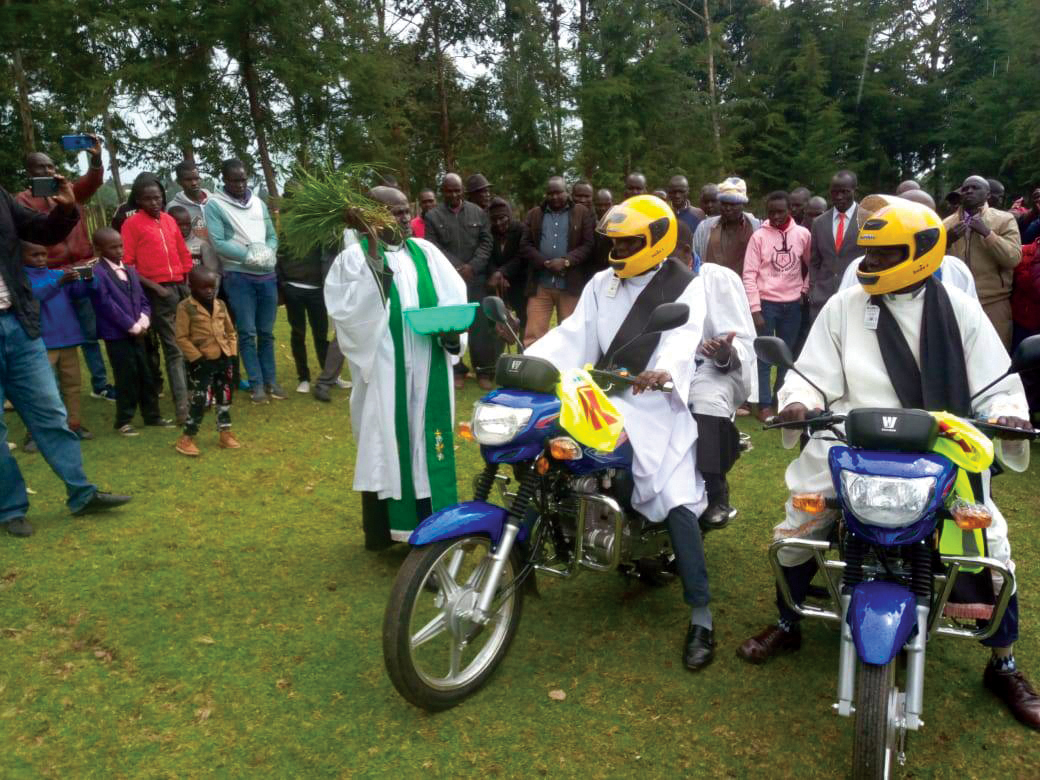 Priests in the Diocese of Kitale in Kenya now can travel via motorcycle to evangelize in remote areas, courtesy of the April 2022 cycle of the global mission grants. According to the Rev. Daniel Katome, “The motorcycles will propel the new church planting in our parish jurisdiction and beyond.”
Priests in the Diocese of Kitale in Kenya now can travel via motorcycle to evangelize in remote areas, courtesy of the April 2022 cycle of the global mission grants. According to the Rev. Daniel Katome, “The motorcycles will propel the new church planting in our parish jurisdiction and beyond.”
[Pictured: (From left) Priests in the Diocese of Kitale now can travel by motorcycle to evangelize in remote areas. Workers tend tomatoes in the St. James Parish greenhouse. Photos courtesy of the Rev. Daniel Katome]
St. James Parish, seven churches located within the Diocese of Kitale, also received a grant in November 2020. The parish serves an agrarian community with high levels of poverty, and the $5,000 grant allowed St. James to establish a tomato greenhouse project to grow disease-free tomatoes for sale to supermarkets, hotels and individuals. The fruits fetch a high price because tomatoes are difficult to grow in the region, and the project helps to build greenhouse gardening skills among local farmers.
REDUCING OUR CARBON FOOTPRINT IN HAITI
The grant received by Church of the Nativity, Raleigh, in May 2021 strengthened the partnership between the church and the Haiti Reforestation Partnership. Grant funds have allowed the director, Michael Anello (who also memorably presented during the 207th Annual Convention in November 2022), to travel to North Carolina for relationship building. In tune with Nativity’s own commitment to composting, funds have also supported the Haiti Reforestation Partnership’s new project to create liquid compost fertilizers at each nursery site. The project is in the pilot stage, with equipment being tested in a handful of nurseries before expanding to all 60 once the concept has proven effective.
As a final piece of the grant, throughout 2021, Nativity calculated the amount of power its buildings used and, after subtracting the power produced by its solar panels, used the Haiti Reforestation Partnership’s Carbon Calculator to determine how many trees the congregation needed to be plant to offset its carbon usage. The church was able to offset 100% of its 2021 usage by planting trees in Haiti. The church documented its journey with carbon offsetting on the blog housed at zerowastechurch.org.
THE NORTH CAROLINA EPISCOPAL CHURCH FOUNDATION
The North Carolina Episcopal Church Foundation (NCECF) was established in 1955 for the purpose of “aiding the expansion of the Church in North Carolina.” Since its inception, the foundation has distributed more than $3,000,000 in grants and loans from the $300,000 raised in the initial capital campaign, additional gifts over time and investment income. Created as a “bricks and mortar” fund, the foundation supports the erection of needed church buildings, acquisition of church property, and capital repairs and innovations. Any church or institution in the Diocese may apply for a loan of up to $150,000 to be repaid quarterly within a 10-year period at an interest rate set by the board of directors. (Currently, the interest rate is 2-4%.) Mission and historic churches also are eligible to apply for grants of up to $10,000.
While it has been serving the Diocese for more than 65 years, the NCECF has not remained stagnant. The foundation continues to meet its mandate of making loans and grants to support capital repairs and improvements, but it currently focuses on work that supports the mission strategy priorities, such as a 2019 grant to St. Timothy’s, Wilson, for energy efficient renovations to the Carriage House, where the church serves a community breakfast every Sunday. The foundation further supports creation care through its green grants program, designed to help congregations make improvements to their physical plant that will conserve natural resources, reduce energy consumption and shrink their carbon footprint. Recently, the NCECF began addressing the question of congregational vitality by dedicating 40% of its funds to the Diocese’s most financially vulnerable congregations.
Perhaps the NCECF’s most significant pivot happened in 2020, with the creation of adaptation and innovation grants in response to the financial hardships presented by the COVID-19 pandemic. Adaptation grants assisted churches with clergy and lay employee salaries and insurance premiums. Recognizing that helping churches reach their communities online was the “bricks and mortar” of the 21st-century church, the NCECF innovation grants gave more than $300,000 in grants to help churches livestream services, start online giving programs and build websites.
All NCECF grant applications are due 45 days prior to the next board meeting, which take place on the second Tuesday of March, June, September and December. Contact the Rev. Brad Mullis, chair of the NCECF, with questions.
MAKING NECESSARY REPAIRS
Between 2020 and 2022, the NCECF, from its regular grant funds, facilitated projects that promoted energy efficiency (new HVAC systems, LED lights and properly sealed doors), health (HVAC filters and mold remediation), and basic safety and longevity for church properties (roof repairs, insulation and gutter replacements). In the case of St. Luke’s, Tarboro, painting and extensive wood repairs to the sanctuary and parish hall coincided with the church’s 150-year celebration in October 2021.
SETTING THE BAR FOR SOLAR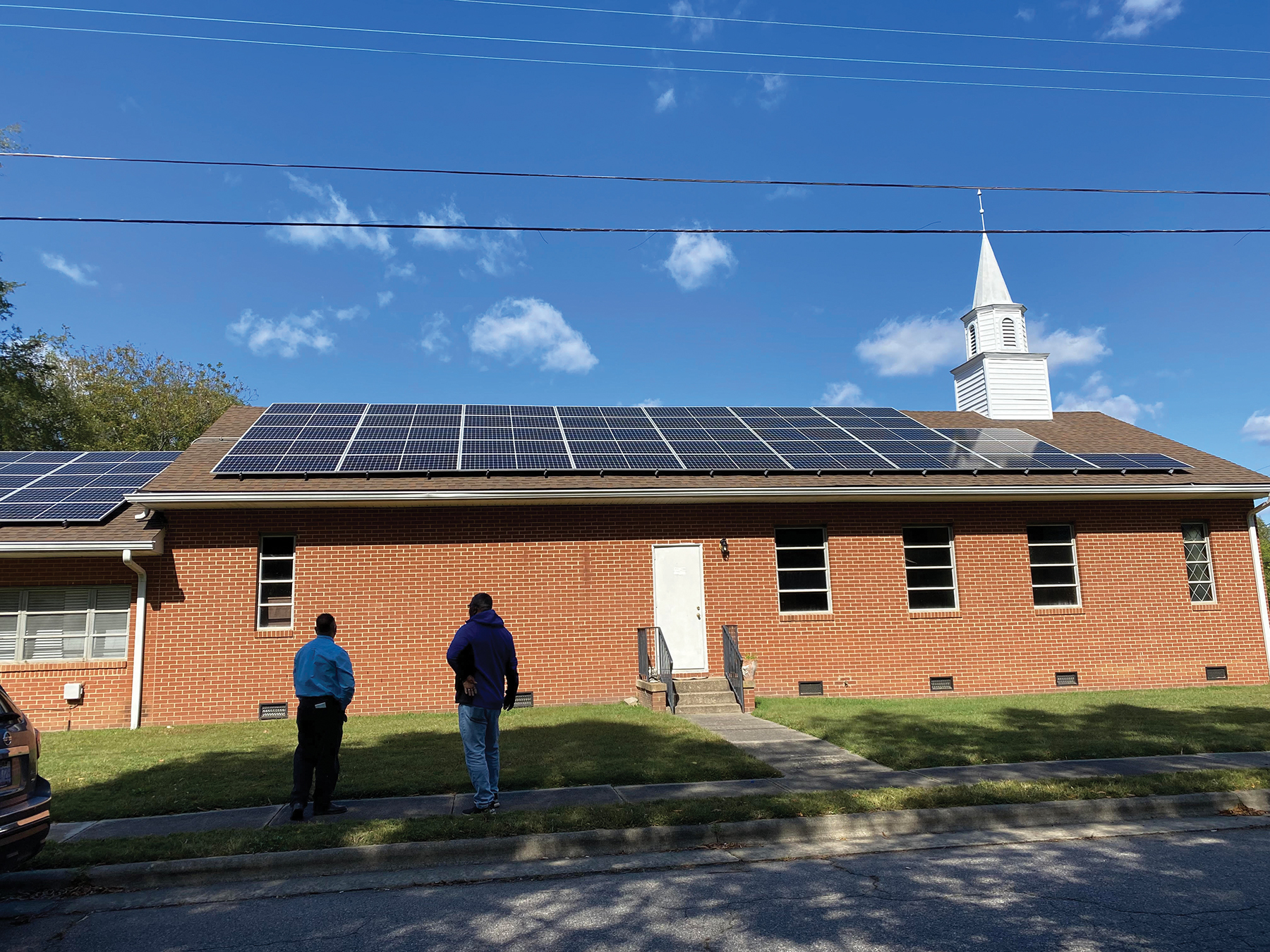 Only one church in Oxford uses solar power: St. Cyprian’s Episcopal Church. Thanks to two NCECF grants—one mission and one green—St. Cyprian’s installed solar panels in October 2021. Solar is a priority for the NCECF, and it will typically fund green grants of up to $10,000 (instead of the usual $5,000) for solar projects.
Only one church in Oxford uses solar power: St. Cyprian’s Episcopal Church. Thanks to two NCECF grants—one mission and one green—St. Cyprian’s installed solar panels in October 2021. Solar is a priority for the NCECF, and it will typically fund green grants of up to $10,000 (instead of the usual $5,000) for solar projects.
“Solar energy, as you all know, is electricity from the sun,” St. Cyprian’s vestry member Ajulo Othow explained via video to the 206th Annual Convention. “It is one of God’s great gifts for us, and we plan to use it wisely to help us become more sustainable as a church and to help us lead our community forward in sustainability. We are proving that it’s possible for a small church. And it’s also helping us save money so we can use that money towards our mission and not towards paying our electric bills.”
[Pictured: The solar panels St. Cyprian’s, Oxford, installed in October 2021 made it the first church in Oxford to use solar power.]
ADDITIONAL DIOCESAN GRANTS
In addition to the grants shared in the stories on the preceding pages, there are even more grants and resources available through the Diocese of North Carolina. Find them all—and a handy beginner’s guide to writing successful grant applications—here.
GREEN GRANTS: NC EPISCOPAL CHURCH FOUNDATION
The Green Grants Program of the North Carolina Episcopal Church Foundation is a special incentive designed to help congregations make improvements to their physical plant that will conserve natural resources, reduce energy consumption and shrink their carbon footprint. The program is intended to encourage congregational efforts to be faithful stewards of the earth God has created. Green Grants are limited to one $5,000 grant per congregation every two years.
GREEN GRANTS: CHARTERED COMMITTEE ON ENVIRONMENTAL MINISTRY
The North Carolina Chartered Committee on Environmental Ministry offers small green grants in the amounts of $250 and $500 to assist congregations interested in starting an environmental ministry program.
LEX MATHEWS SCHOLARSHIP FOR WOMEN
This scholarship provides resources for women seeking specialized training in vocational or technical skills, a degree or certification below the masters or doctorate level, and/or continuing education courses for upgrading job skills. This scholarship is overseen by the Episcopal Church Women’s Lex Matthew’s Scholarship Committee.
MISSIONARY RESOURCE SUPPORT TEAM (MRST) GRANTS
The MRST offers a clergy salary support grant for congregations with an ASA of 150 or fewer. Funds to be applied to clergy salary and benefits are disbursed for the calendar year following application.
SEMINARIAN SCHOLARSHIPS
Seminarian assistance is provided on a yearly basis for seminarians through the Seminarian Assistance Fund and the Trustees of the Francis J. Murdoch Memorial Society. Applications are due annually by May 31, with funds distributed by the end of June. Funds are typically distributed directly to the seminary of the applicant’s choice.
YOUTH SCHOLARSHIPS
The Chartered Committee for Youth (CCY) provides opportunity for scholarship assistance for youth events in two categories: requests for events less than $200 and another for larger requests (which require a more detailed application process). Email Lisa Aycock, diocesan youth missioner, with questions.
THE COMMON APPLICATION
In an effort to streamline the process for those who may want to take advantage of multiple grants offered by the Diocese, the Common Application provides a way to apply for more than one grant by completing a single application. Grants covered by the Common Application produced by the Mission Funding Consortium include the Mission Endowment Grant, the Missionary Resource Support Team (MRST) salary support grants, the parish grants and the North Carolina Episcopal Church Foundation (NCECF) grants. When the Common Application is completed, it is submitted to all four of these granting boards, all of which are looking to disburse their funding to an expanded pool of applicants.
Even if you believe your project qualifies for only one type of funding, the Mission Funding Consortium might be able to help you attain funding from sources you hadn’t considered.
GRANTS BEYOND THE DIOCESE
Though the Diocese offers a wide range of grant and resource support, don’t let your search stop there.
NATIONAL FUND FOR SACRED SPACES
The National Fund for Sacred Spaces is a collaborative partnership between Partners for Sacred Places and the National Trust for Historic Preservation. It seeks to provide “financial and technical support for community-serving historic houses of worship across America.” Grants may be used for building restoration or renovation. To learn more, visit fundforsacredplaces.org.
LILLY ENDOWMENT, INC.
Grants available through the Lilly Endowment work toward the “promotion and support of religious, educational and charitable purposes.” Among its religious initiatives are the “Strengthening Pastoral Leadership,” “Enhancing Congregational Vitality” and “Improving the Public Understanding of Religion.” Learn more at lillyendowment.org.
JESSIE BALL DUPONT FUND
The Jessie Ball DuPont Fund “works to expand access to opportunity and create inclusive growth for the people, organizations and communities.” Its grants focus on projects of equity and placemaking, or those that support the foundation’s “vision of creating communities of belonging.” Learn more at dupontfund.org.
THE EPISCOPAL CHURCH
The Episcopal Church awards almost $10 million in grants and scholarships each year. All information shared here is provided on the Episcopal Church’s website at episcopalchurch.org/grants-and-scholarships. We encourage you to visit the site for more information on the full list of grants and scholarships available.
Becoming Beloved Community Grants - The Episcopal Church’s Becoming Beloved Community grants build capacity in the Church to do the work of racial healing, reconciliation, and justice. The grants may be used for work in these primary fields: telling the truth about our churches and race, proclaiming the dream of Beloved Community, practicing Jesus’ way of healing and reconciliation and repairing the breach in institutions and society.
Creation Care Grants - The Task Force on Creation Care and Environmental Racism seeks to support and expand The Episcopal Church’s loving, liberating, life-giving relationship with God, with each other and with Creation. At The Episcopal Church’s General Convention in 2018, the convening body allocated funds to this task force to support local and regional eco-ministry efforts.
Evangelism Grants - The Episcopal Church’s Evangelism grants fund local and regional evangelism efforts that grow Episcopal ministries, resources and gatherings, and energize the Church to boldly and fearlessly share and celebrate the Good News of Jesus Christ. The Grants Committee considers proposals for both individual congregations and multi-church, diocesan, provincial and other regional collaborations.
New Episcopal Community Grants - The Episcopal Church’s New Episcopal Communities grants are intended to support operating/program expenses such as salary and benefits, insurance, rent, educational materials and other operating needs, and are open to any New Episcopal Community with a sponsoring Episcopal diocese.
Young Adult and Campus Ministry Grants - The Episcopal Church invites applications for grants to assist with Young Adult and Campus Ministries throughout the church. This is a three-step process that includes discernment and planning, writing the application and online submission. This process is designed to help you discern where and how God is calling your community to serve young adults and whether now is the right time to apply for a grant.
United Thank Offering Grants - Over the next three years, The United Thank Offering, in the spirit of Matthew 25:36, will focus on areas of ministry that serve those who society has left out and left behind. The UTO grant focus for 2023 will be on innovative mission and ministry projects addressing all aspects of the worldwide incarceration crisis, specifically preventative programs and intervention, prisoner support outreach, prison reform work or post-prison re-entry.
Tags: North Carolina Disciple
